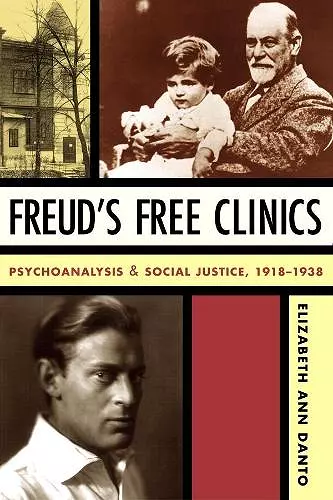Freud's Free Clinics
Psychoanalysis and Social Justice, 1918–1938
Format:Hardback
Publisher:Columbia University Press
Published:3rd Jun '05
Currently unavailable, and unfortunately no date known when it will be back

After World War I, Sigmund Freud, Wilhelm Reich, Erik Erikson, Karen Horney, Erich Fromm, Helene Deutsch, and other psychoanalysts created a network of free outpatient clinics and pioneered important innovations in psychoanalytic treatment and method. In this book, Elizabeth Ann Danto narrates how these psychoanalysts implemented their social activism and their commitment to treating the poor and working classes. She explores the successes and challenges faced by the Berlin Poliklinik, the Vienna Ambulatorium, Alfred Adler's child guidance clinics, and Wilhelm Reich's Sex-Pol, which provided free community-based counseling and sex education and aimed to end public repression of sexuality.
Many view Sigmund Freud as an elitist whose psychoanalytic treatment was reserved for the intellectually and financially advantaged. This work presents a different picture of Freud and early psychoanalytic movement. It recovers the history of Freud and other analysts' social activism and their commitment to treating the poor and working classes.Today many view Sigmund Freud as an elitist whose psychoanalytic treatment was reserved for the intellectually and financially advantaged. However, in this new work Elizabeth Ann Danto presents a strikingly different picture of Freud and the early psychoanalytic movement. Danto recovers the neglected history of Freud and other analysts' intense social activism and their commitment to treating the poor and working classes. Danto's narrative begins in the years following the end of World War I and the fall of the Habsburg Empire. Joining with the social democratic and artistic movements that were sweeping across Central and Western Europe, analysts such as Freud, Wilhelm Reich, Erik Erikson, Karen Horney, Erich Fromm, and Helene Deutsch envisioned a new role for psychoanalysis. These psychoanalysts saw themselves as brokers of social change and viewed psychoanalysis as a challenge to conventional political and social traditions. Between 1920 and 1938 and in ten different cities, they created outpatient centers that provided free mental health care. They believed that psychoanalysis would share in the transformation of civil society and that these new outpatient centers would help restore people to their inherently good and productive selves. Drawing on oral histories and new archival material, Danto offers vivid portraits of the movement's central figures and their beliefs. She explores the successes, failures, and challenges faced by free institutes such as the Berlin Poliklinik, the Vienna Ambulatorium, and Alfred Adler's child-guidance clinics. She also describes the efforts of Wilhelm Reich's Sex-Pol, a fusion of psychoanalysis and left-wing politics, which provided free counseling and sex education and aimed to end public repression of private sexuality. In addition to situating the efforts of psychoanalysts in the political and cultural contexts of Weimar Germany and Red Vienna, Danto also discusses the important treatments and methods developed during this period, including child analysis, short-term therapy, crisis intervention, task-centered treatment, active therapy, and clinical case presentations. Her work illuminates the importance of the social environment and the idea of community to the theory and practice of psychoanalysis.
Historians and readers with a grasp of psychoanalysis will discover a gold mine. Essential for academic collections in psychology and modern European history. Library Journal [Danto's] meticulous research and awesome grasp of the movement's early days... give a surprisingly nimble account. -- Nathan Deuel Village Voice Danto's portrait of psychoanalysis between the two world wars does us a great service... We have much to learn from these pioneers, and Elizabeth Ann Danto deserves our thanks for bringing their efforts to our attention. -- Paul M. Brinich PsycCRITIQUES Danto's meticulously researched year-by-year account of the spread of these psychoanalytic clinics focuses on Freud's pioneering, idealistic, socially committed side. -- Christopher Turner London Review of Books A crucial corrective to the view of psychoanalysis as politically inert and socially disengaged. Choice Danto's book is inspiring in highlighting how a generation of analysts sought to grasp the sources of human misery. -- Ritchie Robertson Times Literary Supplement A must read for anyone interested in psychoanalysis and progressive social responsibility. Psychologist-Psychoanalyst Danto's work will take its place as a classic work in the history of psychoanalytic thought. -- William Borden Psychoanalytic Social Work A dramatic story elegantly told by Danto who has written a compelling, engaging and fascinating account of a largely under-researched aspect of the history of psychoanalysis. With great flair she captures the spirit and ethos of a time when psychoanalysts were committed to a sense of civic responsibility. Social History of Medicine A book that could stimulate inquiry about the way psychoanalysis addresses the social world, and its own place within it, to the benefit of the field. International Journal of Psychoanalysis A worthwhile and gripping story. -- Leslie Leighninger Journal of Sociology and Social Welfare A welcome addition to the literature. -- Eric J. Engstrom H-Net A book that deserves to be more widely read. -- Richard Ruth The Maryland Psychologist Interesting and challenging reading for the question of the social impact of psychoanalysis. -- W. W. Meissner, S.J., M.D. Bulletin of the Menninger Clinic Freud's Free Clinics makes a worthwhile contribution to the historiography of psychoanalysis. -- Greg Eghigian H-Ideas
- Winner of Choice Outstanding Academic Title 2005
ISBN: 9780231131803
Dimensions: unknown
Weight: unknown
352 pages